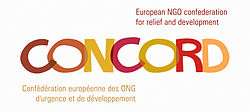CONCORD

CONCORD (European NGO Confederation for Relief and Development) is the European NGO confederation for Relief and Development. It was founded in 2003 and is the main NGO interlocutor with the EU institutions on development policy. As of 2011 it has 28 national associations, 18 international networks and 2 associate member representing 1,800 NGOs which are supported by millions of citizens across Europe. Its members are national NGO platforms and international NGO networks. Its Secretariat is based in Brussels.[1]
The main objective of the Confederation is to enhance the impact of European development NGOs vis-à-vis the European Institutions by combining expertise and accountability.
Since 2003 CONCORD has actively engaged in holding the EU to account on many development related areas such as the EU's development aid policy, its commitment to the UN Millennium Development Goals, policy coherence for development and funding issues.
EU Development Policy
The EU and its Member States are the world's biggest donors of official development assistance.[2] A major area of work for EU development policy operates within the Cotonou agreement which establishes a relationship between the EU and African, Caribbean and Pacific states related to development policy.[3] EU action in the field of development is based on the European Consensus on Development, signed on 20 December 2005, whereby EU Member States, the Council, the European Parliament and the European Commission agreed to a common EU vision of development.
EU partnerships and dialogue with developing countries promote respect for human rights, fundamental freedoms, peace, democracy, good governance, and gender equality, the rule of law, solidarity and justice. European Community's contribution is focused in certain areas of intervention, responding to the needs of partner countries.

CONCORD Publications
CONCORD publishes AidWatch, an annual report on the EU's aid policy. In 2011, the AidWatch report criticised EU members states for increasingly tying overseas development aid to specific domestic and foreign policy goals, inflating aid by 5billion Euros.[4]
CONCORD also publishes a report every 2 years on Policy Coherence for Development (PCD), a legal provision under the EU Lisbon Treaty. PCD aims to ensure that the external impacts of other EU policies do not undermine the aims and objectives of EU development cooperation.[5]
In 2010, CONCORD published its Narrative on Development. The report outlines that European Union Development policies should not pursue unilateral European interests. Legally, they are to support sustainable and human development in developing countries.[6]
CONCORD's Vision and values
CONCORD envisages a world where a prosperous Europe enjoys an open relationship with the global community, sharing wealth and expertise to ensure that all the earth’s citizens live a life of dignity and enjoy full rights to development.
CONCORD acts as a platform for common action at European level, based on the values of respect for the diversity of its membership, the complementarity of expertise, mutual confidence, participation, accountability and transparency.
CONCORD's Mission
CONCORD works to ensure that:
• The EU and member states are fully committed to and implement comprehensive and coherent policies towards the developing world that are based on the principles of solidarity, human rights, justice and democracy, and which aim to address the causes of poverty and conflict and promote sustainable economic and social development.
• The European NGDO movement is active and fully engaged in promoting EU policies that have a positive impact on developing countries and have the capacity to influence the direction of these policies.
• The role of the NGDOs is valued and protected as an authentic voice of European civil society that is engaged in issues of development and global justice.
CONCORD's partners
At global level, CONCORD is actively involved in the Open Forum for CSO Development Effectiveness, the Beyond 2015 campaign, The Humanitarian Forum[7] international network of NGOs and BetterAid.[8] Through these collaborations CONCORD engages with similar NGO networks from South America, Asia and Africa.[9]
External links
References
- ↑ "European NGO confederation for relief and development - About". Retrieved 28 November 2011.
- ↑ "EU Donor Atlas". Brussels, Belgium: European Commission. September 27, 2011. Retrieved 28 November 2011.
- ↑ "The Cotonou Agreement". Brussels, Belgium: European Commission Development and Cooperation - EuropeAid. 9 September 2011. Retrieved 28 November 2011.
- ↑ "EU ‘self interest’ inflates aid by over €5bn in 2010, say NGOs". Brussels,
Belgium: ActionAid International. 19 May 2011. Retrieved 28 November 2011. line feed character in
|location=at position 10 (help) - ↑ "Spotlight on Policy Coherence" (PDF). 6 October 2009. Retrieved 28 November 2011.
- ↑ "CONCORD narrative on Development". Brussels, Belgium: International Trade Union Confederation. Retrieved 28 November 2011.
- ↑ "Associate News: CONCORD opportunity". The Humanitarian Forum. 11 December 2009. Retrieved 19 March 2013.
- ↑ "About". BetterAid for the World we Want. Retrieved 19 March 2013.
- ↑ "European NGO confederation for relief and development - Home". Retrieved 28 November 2011.